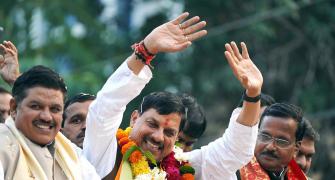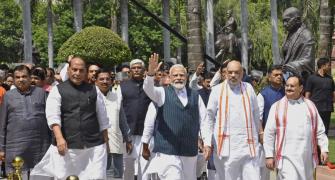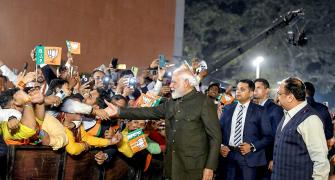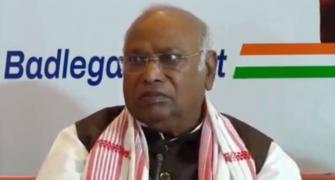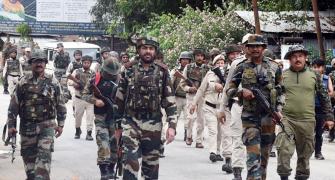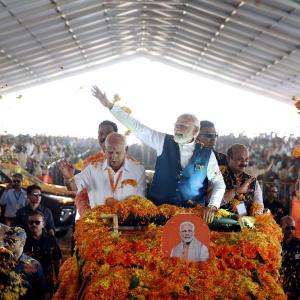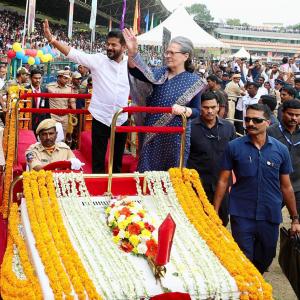'The allegations of government involvement in targeted assassinations abroad are likely to help, not hurt, the ruling party.'
'True or false, they convey a sense of muscularity and, in some quarters, are celebrated as a harbinger of 'great power' status.'

"The January 2024 inauguration of the Ram Mandir in Ayodhya will allow the party to signal its commitments to its core Hindu base. The images from Uttar Pradesh will be enough; the narrative writes itself," Milan Vaishnav, senior Fellow and director of the South Asia Program at the Carnegie Endowment for International Peace in Washington, DC, tells Aditi Phadnis/Business Standard in New Delhi.
How do you see the outcome of the assembly elections in terms of the upcoming Lok Sabha elections? Has welfarism won, or lost?
Before this most recent clutch of five state elections, the BJP was already the clear front runner in the 2024 race.
These results further reduce our levels of uncertainty about the outcome of next year's poll.
Heading into the assembly elections, the Congress anticipated winning at least two of the three Hindi belt states, with some officials going out on a limb and predicting a clean sweep of the Hindi heartland.
To lose Chhattisgarh, Madhya Pradesh, and Rajasthan is a nightmare for the Congress.
It diminishes the morale of the cadre, weakens the party's leverage with its INDIA coalition partners, and undermines the party's ability to muster desperately needed resources to mount a long-shot challenge to the BJP.
Beyond this, there is no pithy takeaway from these results. Each state has its own nuances.
I don't think we can conclusively say whether welfarism won or lost.
After all, what we witnessed -- and will certainly see again next spring -- is a competitive arms race in welfare spending across all parties and all states.
Today, welfarism has become a necessary -- but insufficient -- condition to triumph in Indian elections.
Unfortunately for the Congress, it faces a distinct disadvantage vis-a-vis the BJP for three reasons.
First, the Narendra Modi government has saturated the welfare space, leaving little room for innovation.
Second, the BJP's welfarism is closely associated with the prime minister, a message reinforced by the on-the-ground efforts of the Sangh Parivar.
Third, there is a common perception that the BJP has delivered on its welfare promises, especially among women voters.
Before 2014, the BJP had a 'woman"'problem; according to Lokniti-Centre for the Study of Developing Societies data, female voters were less likely to support the BJP relative to the Congress.
Today, the opposite is true, and the gender deficit has reversed.
We're still waiting to see the BJP's 'big idea' for the Lok Sabha elections. What could this be: pro-poor reform? Nationalism? India's place in the world?
The BJP has not one, but several 'big ideas' it is refining.
Cementing India's place in the world is certainly one of them, an idea that a year-long G20 marketing blitz has consolidated.
As if on cue, the January 2024 inauguration of the Ram Mandir in Ayodhya will allow the party to signal its commitments to its core Hindu base.
The images from Uttar Pradesh will be enough; the narrative writes itself.
On welfare, the government has already announced a five-year extension of its free foodgrain programme, which benefits 800 million households.
I would not be surprised if we see other welfarist announcements in the interim Budget next year.
Given Modi's unmatched popularity, this trio of narratives is probably enough to ensure a comfortable majority for the National Democratic Alliance in the general election, unless the Opposition can quickly mitigate its leadership, organisational, and ideological infirmities -- a prospect that appears highly unlikely, given the current trajectory and limited time frame.
Is foreign policy now becoming an indivisible part of domestic politics?
In this context, how do you see India-US relations panning out after the US Department of Justice's revelation that India planned the assassination of Gurpatwant Singh Pannun?
Do you envisage a fallout in Punjab politics?
To my mind, foreign policy has become a mass issue. It no longer exists simply in the domain of the elites.
Whether ordinary citizens can talk knowledgeably and in great detail about the outcomes of the G20 summit, China-India relations, or the strategic embrace between the US and India is beside the point.
Many Indians believe that India now has a seat at the Global High Table and that it was Modi who paved the way for this success.
Due to its entrenched inequalities, India is widely known to be a status-conscious society.
But that consciousness does not stop at the level of caste, region, religion, or income.
Citizens in most large countries also care about their country's status in the global system.
For a long time, many Indians have felt that their nation was punching well below its weight. I don't think this is a widely held view any longer.
Moreover, the allegations of government involvement in targeted assassinations abroad are likely to help, not hurt, the ruling party.
True or false, they convey a sense of muscularity and, in some quarters, are celebrated as a harbinger of 'great power' status.
Although there are a lot of false analogies out there (the examples of Osama bin Laden and Iranian General Qasem Soleimani have often been raised, for instance), there is also enough hypocrisy on display in Western nations to undercut whatever moral authority the latter may have.
Feature Presentation: Aslam Hunani/Rediff.com


